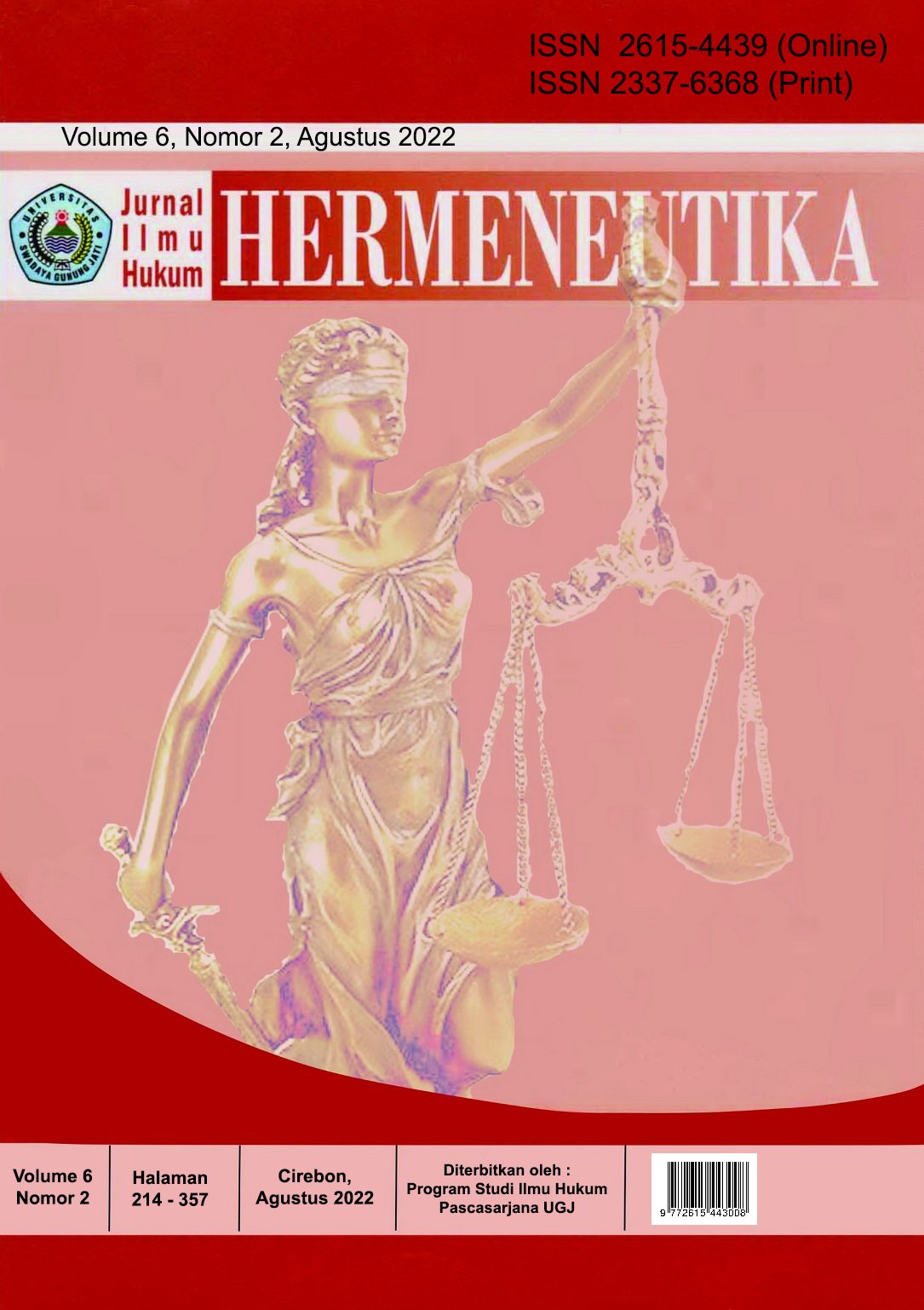CORPORATE CRIMINAL LIABILITY IN LAW ENFORCEMENT AGAINST PREMANISM
DOI:
https://doi.org/10.33603/hermeneutika.v6i2.7462Abstract
References
Adami Chazawi, Pelajaran Hukum Pidana Bagian I, PT.Raja Grafindo Persada, Jakarta, 2012.
Andi Hamzah, Hukum Acara Pidana Indonesia, Sinar Grafika, Jakarta, 2013.
Barda Namawi Arief, Masalah Penegakan Hukum dan Kebijakan Penanggulangan Kejahatan, PT. Citra Aditiya Bakti, Bandung, 2001.
C.F.G. Sunaryati Hartono, Penelitian Hukum Di Indonesia Pada Akhir Abad Ke-20, Alumni, Bandung, 1994.
Erdianto Effendi, Hukum Pidana Indonesia, Suatu Pengantar, Rafika Aditama, Bandung, 2010.
Kaleidoskop, “Kasus Premanisme di Ibu Kotaâ€, https://megapolitan.kompas.com/read/2018/12/31/21171121/kaleidoskop-2018-kasus-premanisme-di-ibu-kota[diakses tanggal 17/12/2021, pukul 16:36]
Kristian, “Urgensi Pertanggungjawaban Pidana Korporasiâ€, Jurnal Hukum dan Pembangunan, Volume 3, Nomor 1, Oktober-Desember 2013.
Masrudi Muchtar, Debt Collector Dalam Optik Kebijakan Hukum Pidana, Aswaja Presindo, Yogyakarta, 2013.
Muladi dan Dwidja Priyatno, Pertanggungjawaban Pidana Korporasi, Penerbit Kencana Prenada Media Group, Jakarta, 2010.
Republika, “Premanisme di Pasar Tasik, Tanah Abang 10 Orang Ditangkapâ€, https://nasional.republika.co.id/berita/pxeigl414/premanisme-di-pasar-tasik-tanah-abang-10-orang-ditangkap[diakses tanggal 17/12/2021, pukul 18:42]
RUU Kitab Undang-Undang Hukum Pidana.
Sholehuddin, Sistim Sanksi Dalam Hukum Pidana, Ide dasar Double Track System dan Implementasinya, Penerbit PT. Rajagrafindo Persada, Jakarta, 2003.
Sutan Remy Sjahdeini, Pertanggungjawban Pidana Korporasi, Grafitti Press, Jakarta, 2006.
Downloads
Published
Issue
Section
Citation Check
License
The Authors submitting a manuscript do so on the understanding that if accepted for publication, copyright of the article shall be assigned to Jurnal HERMENUTIKA, Sekolah Pascasarjana Ilmu Hukum. Universitas Swadaya Gunung Jati as publisher of the journal. Copyright encompasses rights to reproduce and deliver the article in all form and media, including reprints, photographs, microfilms, and any other similar reproductions, as well as translations.
Jurnal HERMENEUTIKA, Universitas Swadaya Gunung Jati and the Editors make every effort to ensure that no wrong or misleading data, opinions or statements be published in the journal. In any way, the contents of the articles and advertisements published in Jurnal HERMENEUTIKA are the sole responsibility of their respective authors and advertisers.









